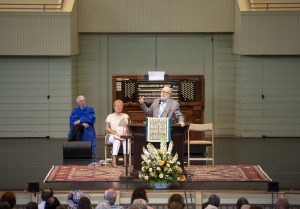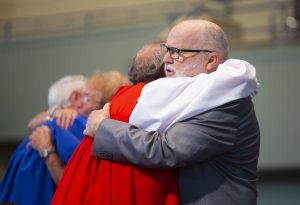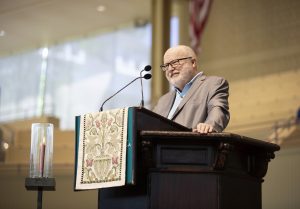
MHARI SHAW/STAFF PHOTOGRAPHER
“Christ is not Jesus’ last name, but we have operated as if it is and that has not helped the Christian message,” said Fr. Richard Rohr, OFM, at the 10:45 a.m. Ecumenical Service of Worship and Sermon Sunday in the Amphitheater.
His sermon title was “Something Larger than Jesus,” and the Scripture text was John 1:1-18. He will be using material from his book, The Universal Christ: How a Forgotten Reality Can Change Everything We See, Hope For and Believe, for the morning worship service Monday through Friday.
There is something bigger than Jesus, and that is Christ, Rohr said.
“I am going to use the Scripture to make this entirely clear, and you will see that I am not the heretic I may appear to be at the beginning,” he said.
That Christ became flesh has been a mystery for too long.
“My translation is that the blueprint became visible,” Rohr said. “That blueprint did not begin some several million years ago, but began 13.6 billion years ago.”
Rohr said today’s children have grown up with the findings of the Hubble Space Telescope.
“They will not be satisfied with a God that is not at least as big as the universe,” he said. “I grew up thinking that there were millions of stars in the sky. Now scientists tell us there are six galaxies for every person on earth.”
If God is some “johnny come lately” who creates beauty and takes away sin, then this God is only plan B. Christ was plan A, present in the creation of everything we have ever seen, Rohr told the congregation.
“The incarnation and the creation was the first Bible, but we have murdered the second one,” he said. “We have used the sacred text to murder and divide people.”
He read Romans 1:19-20, “just so you know that Catholics do know something about Scripture.” These two verses say that what can be known about God is plain, for God’s eternal power and divine nature are understood and seen through creation.

“If I am not rearranging your mind, you are not hearing me,” Rohr said.
In John 1:14, the word “flesh” is generic.
“It does not say the Word became Jesus,” Rohr said. “I am not denying that Jesus became Christ, but everything material — the sky, the trees, your bodies — are an outpouring of God. What else could you be?”
As people have tried to understand the Bible, they have called it poetry and then looked at it as literal description.
“Literalism is the lowest level of meaning,” Rohr said. “Symbolic meaning is the greatest level because it includes many contrary possibilities.”
Because people have approached the Bible with an either/or mentality, the Bible is the most hated book in the world.
“It has been used to mangle and destroy,” he said. “It has been used to justify slavery, apartheid and gender inequality.”
No wonder, he said, that people do not approach the Bible with spiritual curiosity. He likened the spiritual discipline of Lectio Divina, to pray over a text to understand what is in it, to Jewish Midrash.
“It could mean this, it might mean that, it probably does not mean that,” he said. “Why is there only one way, right or wrong, Republican or Democrat, American or Mexican? Why are we forced to choose sides? Such arrogance cannot know God because it is stuck on itself.”
Christ existed from the beginning.

“Don’t jump right to Jesus,” Rohr said. “He became the Christ or revealed the Christ. We need a God as big as the universe.”
In his first years as a priest in Cincinnati, Rohr often went to men’s breakfasts and prayer breakfasts.
“Men love winners and losers,” he said. “I wondered, what if the gospel is win-win? Why does everything have to be a zero-sum game? Why live life as if in order for you to win, someone else has to lose?”
A business man approached Rohr at one of the Cincinnati breakfasts, and with pity in his voice, said, “Father, Father, that wouldn’t even be interesting.”
Rohr noted that much of Western art depicts Jesus dividing people into those who are invited into the kingdom and those cast into eternal darkness.
“Neuroscientists tell us the human mind cannot form any notion of infinity or eternity,” he said. “The infinite God is beyond comprehension. The infinite God is infinite in mercy, infinite in grace, infinite in love.”
Rohr asked the congregation, “What is half of infinity?” They answered, “infinity.”
The problem, he said, “was solved from the beginning, which is exactly what Ephesians says, which we will explore tomorrow.”
The Rt. Rev. V. Gene Robinson, vice president of religion and senior pastor, presided. Jane McCarthy, president of the board of the Chautauqua Catholic Community and an associate in the Department of Religion, read the Scriptures. The Chautauqua Choir sang “Bless the Lord, O My Soul” by Mikhail Ippolitov-Ivanov as the choral introit. Peter Steimetz served as cantor for the hymn “God, Beyond All Names,” by Bernadette Farrell. The choral response to the morning prayers was “Let All Mortal Flesh Keep Silence,” arranged by Gustav Holst with words translated by Gerard Moultrie. The offertory anthem, sung by the Chautauqua Choir, was “Psalm 23,” by Michael Hennagin. The anthem was a gift from the Chautauqua Choir to the Institution’s choral library in tribute to J.M. Ross Mackenzie upon his retirement as director of the Department of Religion. Jared Jacobsen, organist and coordinator of worship and sacred music, conducted the choir and played Toccata in D-flat, Op. 104, by Joseph Jongen for the postlude. The Alison and Craig Marthinsen Endowment for the Department of Religion provides support for this week’s services.




